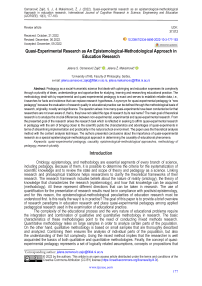Quasi-experimental research as an epistemological-methodological approach in education research
Автор: Jelena Osmanović Zajić, Jelena Maksimović
Журнал: International Journal of Cognitive Research in Science, Engineering and Education @ijcrsee
Рубрика: Review articles
Статья в выпуске: 3 vol.10, 2022 года.
Бесплатный доступ
Pedagogy as a social-humanistic science that deals with upbringing and education expresses its complexity through a plurality of ideas, understandings and opportunities for studying, learning and researching educational practice. The methodology dealt with by experimental and quasi-experimental pedagogy is exact and serves to establish reliable data, i.e., it searches for facts and evidence that can replace research hypotheses. A synonym for quasi-experimental pedagogy is “new pedagogy” because the evaluation of research quality in educational practice can be defined through the methodological basis of research, originality, novelty and significance. The question arises: how many quasi-experiments have been conducted so far that researchers are not even aware of, that is, they have not called this type of research by its real name? The main goal of theoretical research is to analyze the crucial differences between non-experimental, experimental and quasi-experimental research. From the presented goal of the research arises the research task which is reflected in seeking to affirm quasi-experimental research in pedagogy with the aim of bringing closer to the scientific public the characteristics and advantages of quasi-experiments in terms of streamlining implementation and practicality in the natural school environment. The paper uses the theoretical analysis method with the content analysis technique. The authors presented conclusions about the importance of quasi-experimental research as a special epistemological-methodological approach in determining the causality of educational phenomena.
Quasi-experimental pedagogy, causality, epistemological-methodological approaches, methodology of pedagogy, research plurality
Короткий адрес: https://sciup.org/170198684
ID: 170198684 | DOI: 10.23947/2334-8496-2022-10-3-177-183
Список литературы Quasi-experimental research as an epistemological-methodological approach in education research
- Al-Ababneh, M. M. (2020). Linking ontology, epistemology and research methodology. Science & Philosophy, 8(1), 75-91. https://doi.org/10.23756/sp.v8i1.500
- Antwi, S. K., & Hamza, K. (2015). Qualitative and quantitative research paradigms in business research: A philosophical reflection. European journal of business and management, 7(3), 217-225, Retrieved from https://www.iiste.org/ Journals/index.php/EJBM/article/view/19543
- Banđur, V., & Potkonjak, N. (1999). Metodologija pedagogije [Methodology of pedagogy]. Beograd: SPDJ
- Bryman, A. (1988). Quantity and quality in social research. London: Routledg
- Craig, S. B., & Hannum, K. M. (2007). Experimental and quasi-experimental evaluations. The handbook of leadership development evaluation, 19-47. Retrieved from https://www.researchgate.net/publication/238733566_EXPERIMENTAL_AND_ QUASI-EXPERIMENTAL_EVALUATIONS
- Denzin, N. K., & Lincoln, Y. S. (2000). Introduction: The discipline andpractice of qualitative research. In N. K. Denzin & Y. S. Lincoln (Eds.). Handbook of qualitative research (2nd ed., pp. 1–28). Thousand Oaks, CA: Sage.
- Fajgelj, S. (2010). Metode istraživanja ponašanja [Behavioral research methods]. Beograd: CPP.
- Gojkov, G., Krulj, R., & Kundačina, M. (1999). Leksikon pedagoške metodologije. Vršac: Visoka škola za obrazovanje vaspitača.
- Gopalan, M., Rosinger, K., & Ahn, J. B. (2020). Use of Quasi-Experimental Research Designs in Education Research: Growth, Promise, and Challenges. Review of Research in Education, 1(44), 218–243. https://doi.org/10.3102/0091732X20903302
- Guba, E. G., & Lincoln, Y. S. (1988). Naturalistic and rationalistic enquiry. Educational research, methodology and measurement: An international handbook, 81-85. https://www.researchgate.net/profile/Russell_Gersten/publication/228355202_ Quality_Indicators_for_Group_Experimental_and_Quasi-Experimental_Research_in_Special_Education/ links/02e7e52c1eb8b7f8a2000000.pdf
- Halmi, A. (2005). Strategije kvalitativnih istraživanja u primijenjenim društvenim znanostima [Qualitative research strategies in applied social sciences]. Naklada Slap.
- Hebib, E., & Matović, N. (2012). Istraživački rad školskog pedagoga [School pedagogues and research]. Nastava i vaspitanje, 61(1), 67-82. Retrieved from https://reff.f.bg.ac.rs/handle/123456789/1387
- Howe, K. R. (1988). Against the quantitative-qualitative incompatibility thesis or dogmas die hard. Educational researcher, 17(8), 10-16. https://doi.org/10.3102/0013189X017008010
- Kamal, S. S. L. B. A. (2019). Research paradigm and the philosophical foundations of a qualitative study. PEOPLE: International Journal of Social Sciences, 4(3), 1386-1394. https://dx.doi.org/10.20319/pijss.2019.43.13861394
- Knežević-Forić, O., & Ninković, S. (2012). Horizonti istraživanja u obrazovanju [Horizons of research in education]. Novi Sad: Filozofski fakultet, odsek za pedagogiju. Retrieved from https://digitalna.ff.uns.ac.rs/sites/default/files/db/books/ HORIZONTI%20ISTRAZIVANJA%20U%20OBRAZOVANJU.pdf
- Levy, Y., & Ellis, T. J. (2011). A guide for novice researchers on experimental and quasi-experimental studies in information systems research. Interdisciplinary Journal of information, knowledge, and management, 6, 151–161. Retrieved from https://core.ac.uk/download/pdf/51072279.pdf
- Lowhorn, G. L. (2007, May). Qualitative and quantitative research: How to choose the best design. In Academic Business World International Conference. Nashville, Tennessee. Retrieved from https://ssrn.com/abstract=2235986
- Milas, G. (2005). Istraživačke metode u psihologiji i drugim društvenim znanostima [Research methods in psychology and other social sciences]. Zagreb: Naklada Slap.
- Muijs, R. D. (2004). Doing quantitative research in Education with SPSS. New Delhi: Sage Publications, London, Thousand Oaks. Retrieved from https://www.modares.ac.ir/uploads/En-Agr.Doc.AgriculturalExtension.18.pdf
- Nahod, S. (1999). Sto godina od uvođenja eksperimenta u pedagogiju [One hundred years since the introduction of experiments in pedagogy]. Nastava i vaspitanje, 5(48), 618–639. http://scindeks.ceon.rs/article.aspx?query=ISSID%26and%26911 &page=7&sort=8&stype=0&backurl=%2Fissue.aspx%3Fissue%3D911
- Preglej, L. (2014). Istraživanja u nastavi. Educatio biologiae: časopis edukacije biologije, (1), 100-116. Retrieved from https:// hrcak.srce.hr/148934
- Rehman, A. A., & Alharthi, K. (2016). An introduction to research paradigms. International Journal of Educational Investigations, 3(8), 51-59. Retrieved from http://www.ijeionline.com/attachments/article/57/IJEI.Vol.3.No.8.05.pdf
- Shorten, A., & Smith, J. (2017). Mixed methods research: expanding the evidence base. Evidence-based nursing, 20(3), 74-75. http://dx.doi.org/10.1136/eb-2017-102699
- Sladoje Bošnjak, B. (2018a). Proces naučnog saznanja u pedagogiji [The process of scientific knowledge in pedagogy]. Istočno Sarajevo: Matična biblioteka.
- Sladoje Bošnjak, B. (2018b). Epistemologija pedagogije [Epistemology of pedagogy]. Godišnjak za pedagogiju, 3(1), 47-53.
- Sladoje Bošnjak, B. (2019). Teoantropološki aspekti u vaspitanju: doprinos istoriji nacionalne pedagogije [Theoanthropological aspects in education: contribution to the history of national pedagogy]. Beograd: Jasen.


